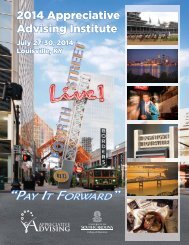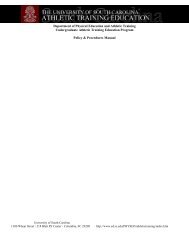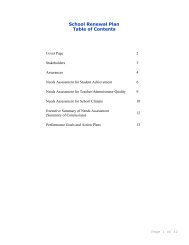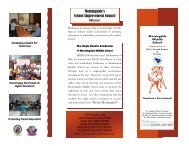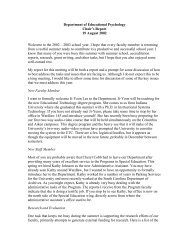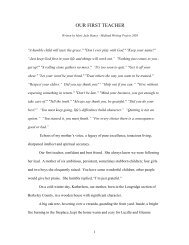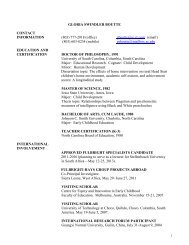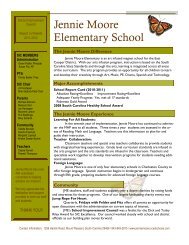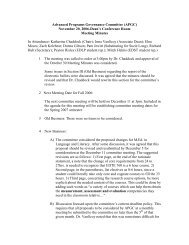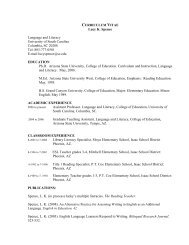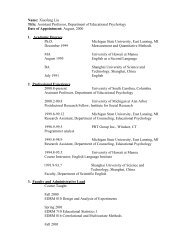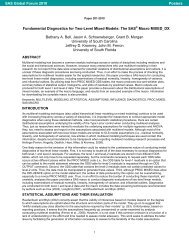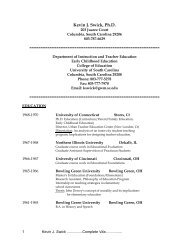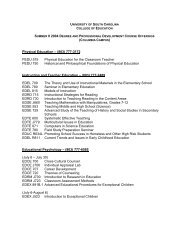Urban Cohort - College of Education - University of South Carolina
Urban Cohort - College of Education - University of South Carolina
Urban Cohort - College of Education - University of South Carolina
You also want an ePaper? Increase the reach of your titles
YUMPU automatically turns print PDFs into web optimized ePapers that Google loves.
! EARLY CHILDHOOD<br />
EDUCATION ASSEMBLY OF<br />
NCTE .........................1<br />
! FROM THE AFFIRMATIVE<br />
ACTION COMMITTEE:<br />
HONORING<br />
DIVERSITY................2-4<br />
! MEMBER PUBLICATIONS<br />
LIST………………...5-6<br />
ISSUE 1 VOLUME 1 2009<br />
News<br />
EARLY CHILDHOOD EDUCATION ASSEMBLY OF NCTE:<br />
THE AUDACITY OF CHANGING THE FACE OF EARLY LITERACY EDUCATION!<br />
Supporting teachers <strong>of</strong> young children, with a strong emphasis on<br />
promoting thoughtful practices that enhance the teaching and learning<br />
<strong>of</strong> young children within and across diverse communities.<br />
Early Childhood <strong>Education</strong> Assembly <strong>of</strong> NCTE<br />
At the end <strong>of</strong> a very exciting Day <strong>of</strong><br />
Early Childhood at the NCTE<br />
convention in November 2008, the<br />
proposed Early Childhood <strong>Education</strong><br />
Assembly (ECEA) held a special<br />
interest group meeting to vote on<br />
various aspects <strong>of</strong> the assembly.<br />
Since that meeting, the ECEA<br />
leadership worked diligently at<br />
submitting the necessary paperwork<br />
required to complete the process <strong>of</strong><br />
gaining assembly status. In February<br />
2009, the NCTE Executive Committee<br />
voted to award this status.<br />
The 2009 NCTE Annual Convention<br />
marks our first time to participate as<br />
an assembly! To commemorate this<br />
event, together with members <strong>of</strong> the<br />
Board, we have put together a<br />
powerful set <strong>of</strong> presentations that we<br />
hope will push your thinking and<br />
create spaces for much needed<br />
conversations regarding literacy<br />
learning and teaching with young<br />
children.<br />
Thank you for your encouragement<br />
and support! We look forward to<br />
hearing from you, working with you,<br />
and supporting your needs!<br />
Vivian Vasquez<br />
(ECEA Chair)<br />
Mariana Souto-Manning<br />
(ECEA Assistant Chair)<br />
Announcing The First All-Day NCTE Workshop<br />
For Teachers Of Young Children<br />
Join An Array Of Early Literacy Educators To Explore A Variety Of Issues:<br />
Writing, Talking, and Playing Between the Lines<br />
Anne Haas Dyson and Celia Genishi<br />
Writing that Matters: First Grade Authorship<br />
Maria Paula Ghiso<br />
Building from Young Children’s Home and<br />
Community Literacies<br />
Susi Long and Dinah Volk<br />
Teaching African American Speakers<br />
Gloria Boutte and George Johnson<br />
Literature Circles: Involving English Language Learners<br />
Julia Lopez-Robertson<br />
Critical Literacies in Early Childhood Classrooms<br />
Mariana Souto-Manning and Vivian Vasquez
Changes in Early Childhood Teacher <strong>Education</strong><br />
at the <strong>University</strong> <strong>of</strong> <strong>South</strong> <strong>Carolina</strong>:<br />
New Visions for <strong>Urban</strong> <strong>Education</strong><br />
By: Erin Miller, Gloria Swindler Boutte, Saudah Collins, Susi Long,<br />
Julia López-Roberston, Beth Powers-Costello<br />
I chose to sign up for this cohort because facing a diverse classroom was<br />
the one thing that concerned me the most as a prospective teacher! I<br />
wanted to make sure that I was adequately prepared for this challenge!<br />
!<br />
I tried every day over the summer to snag a spot in this section, and I’m<br />
glad I did. Embracing social justice is something that many do not<br />
understand, or want to understand. I want to be prepared to work in<br />
any kind <strong>of</strong> school with all different children… I want to be able to reach<br />
all children. I want my children to know that I care and that they are<br />
valued and important. This cohort has already helped shape me into<br />
the teacher I want to be, and I know that there is so much to be learned.<br />
!<br />
These comments from two Early Childhood pre-service teachers reflect a growing concern in<br />
teacher education: pre-service teacher education students need more opportunities to learn<br />
how to honor and understand diverse ways <strong>of</strong> knowing. Scholars concerned about teacher<br />
education assert that it is imperative that pre-service teachers “experience a more accurate<br />
picture <strong>of</strong> what it means to live and work in a multi-cultural and democratic society” (Ladson-<br />
Billings, 2005, p. 231). To meet these challenges, a group <strong>of</strong> faculty members at the <strong>University</strong> <strong>of</strong><br />
<strong>South</strong> <strong>Carolina</strong> (USC) developed an <strong>Urban</strong> <strong>Cohort</strong> Strand, a unique way to engage students<br />
through a series <strong>of</strong> courses designed specifically to better prepare our pre-service teachers to<br />
teach in diverse settings.<br />
As six Early Childhood instructors who teach junior and senior pre-service teacher<br />
education courses at USC, we came together to collaboratively explore how we could better<br />
address the national and local issue <strong>of</strong> an inadequately prepared teaching force. We were<br />
inspired to engage in such an effort for many reasons, and designed the cohort to address those:<br />
Creating an <strong>Urban</strong> <strong>Cohort</strong> (UC):<br />
Beliefs That Motivated Faculty<br />
a)!Children <strong>of</strong> Color in our state are not achieving in our<br />
public schools because <strong>of</strong> structural and societal<br />
inequities.<br />
b) Having a homogenous teacher force has an impact<br />
on young children’s first experiences in schools.<br />
c) A small community <strong>of</strong> faculty might be able to work<br />
through issues that could then be considered in larger<br />
contexts. Together we might come to understand and<br />
respond to the demands <strong>of</strong> teaching “against the<br />
grain” (Cochran-Smith, 2004).<br />
d) Naming the strand <strong>Urban</strong> <strong>Cohort</strong>, while rife with<br />
complexities, is important if we want to legitimize<br />
explorations <strong>of</strong> equity and justice as foundational to<br />
educational methods courses.<br />
e) Learning about social justice is an ongoing process.<br />
We are committed to deepening our pr<strong>of</strong>essional<br />
knowledge as we continuously consider how to most<br />
effectively synthesize and organize key aspects <strong>of</strong> our<br />
learning for our students.<br />
Framework for Program Design<br />
a)!Diversity is seen as a resource and an asset<br />
rather than a deficit.<br />
b) Skills and strategies are taught in a way that<br />
build on home and community knowledge and<br />
literacies.<br />
c) Critical examinations <strong>of</strong> oppressive (e.g.,<br />
structural, cultural, institutional) dynamics that<br />
impact historically marginalized students are<br />
explored.<br />
d) Strategies are developed for tackling institutional<br />
practices that reinforce inequitable practices.<br />
2
Share your<br />
Experience<br />
As part <strong>of</strong> the ECEA<br />
newsletter the Affirmative<br />
Action Committee has<br />
created a section to<br />
highlight and share the work<br />
early childhood educators<br />
are doing to honor the<br />
diverse cultural and linguistic<br />
resources <strong>of</strong> young children.<br />
We would like to invite the<br />
ECEA community to write us<br />
and share--through a short<br />
essay, pictures, quotes,<br />
poetry, etc--the work <strong>of</strong><br />
children, teachers and/or<br />
teacher educators in<br />
supporting social justice,<br />
equity and diversity. If you<br />
have a story to share you<br />
can contact Carmen<br />
Medina:<br />
Carmen_liliana_medina@<br />
hotmail.com<br />
! !When we opened up the invitation for students to join<br />
the urban cohort, we explained that there would be possibilities for out<strong>of</strong>-class<br />
learning experiences; such as field trips, relevant conference<br />
attendance, and film viewing. Our goal for these activities was to help<br />
build a community <strong>of</strong> learners who could not only support one another<br />
but who could also push each other’s thinking in a safe and trusting<br />
environment. We later found that this component proved to be one <strong>of</strong><br />
the incentives for students to join the UC. Students also shared other<br />
reasons for participation. Many students reported that they saw a clear<br />
need for knowing how to teach “all different children”; others reflected<br />
they wanted to challenge their ideas about children from backgrounds<br />
other than their own. And some described rationales that were laced<br />
with a “missionary appeal” we hoped to counter. For example, Olivia<br />
wrote:<br />
I chose the <strong>Urban</strong> <strong>Cohort</strong> Strand for several reasons. I<br />
have grown up in a lower-middle class family.<br />
Through my early childhood and middle school years,<br />
I grew up down the street from a largely African<br />
American population . . . I have a close friend who<br />
became my friend as I spent time thinking I was<br />
helping her. In turn, I have gained so much from her<br />
friendship and life and, really, she has helped me. I<br />
guess what I am trying to say is that somehow in my<br />
‘whiteness’ in my past, I thought maybe I can help to<br />
rescue someone from their poverty or circumstances.<br />
This was one <strong>of</strong> the perspectives we hoped to help our students<br />
examine: that teaching for equity was not about becoming a “great<br />
White hope” or “rescuing” students; it was about engaging in ongoing<br />
dialogue about the existence and impact <strong>of</strong> unexamined<br />
discrimination on teachers’ day-to-day decisions and children’s<br />
opportunities as learners.<br />
Implementation<br />
Approximately 40 students initially expressed interest, and more than 50 ultimately<br />
registered for the cohort sections. Although the project is early in its implementation, the feedback we<br />
have received from the students has been overwhelmingly positive. In addition to taking two Early<br />
Childhood methods courses (Language and Literacy, and Integrated Curriculum) with foci on diversity<br />
and issues <strong>of</strong> equity in education explored through readings, class discussions and class activities, the<br />
students also have opportunities to meet on campus with the six <strong>Urban</strong> <strong>Cohort</strong> instructors. The first out<strong>of</strong>-class<br />
event was to view and discuss the 2007 film, The Great Debaters. This film explores the racism<br />
experienced by the Wiley <strong>College</strong> African American debate team as they were successfully led to win<br />
the National Debate Championship in 1935. Following the film, students reported an early shift in their<br />
thinking, reminding us <strong>of</strong> the lack <strong>of</strong> prior exposure many university students have had to historic and<br />
current oppression. One student responded, “I knew about prejudice but I never knew the level <strong>of</strong><br />
violence that African American people suffered in the past.” Another student reflected on the strict<br />
discipline style that Denzel Washington exhibited in the movie. She shared that although his insistence<br />
on excellence could have appeared to be overly stern, it was what the students needed to succeed.<br />
This helped the group to consider the fact that effective teaching requires consideration <strong>of</strong> students<br />
and their context, not simply using recipes for teaching. Next month the students and pr<strong>of</strong>essors plan to<br />
attend the film Good Hair , which explores the cultural significance as well as critical implications <strong>of</strong><br />
issues surrounding hairstyling in African American communities. The following month we will view the<br />
CNN series Latino in America through a critical lens. We feel that these out-<strong>of</strong>-class activities are<br />
essential to developing the skill set needed to have thoughtful, open, and critical dialogue with others<br />
centered on issues <strong>of</strong> diversity and justice.<br />
3
! !As we write this piece, we are only halfway into the first semester <strong>of</strong><br />
this endeavor. Our students were asked to fill out mid-semester evaluations<br />
reflecting on their experiences thus far. Many claim that they are being<br />
pushed to think in new ways about their own cultural backgrounds and the<br />
lens with which they view the world. For example, Rebecca explained,<br />
“This section has made me think about my future teaching and also dug<br />
deep into my cultural identity.” Danielle added, “I am looking at shows,<br />
children, news, movies, everything, differently now because <strong>of</strong> the things<br />
that we talk about in class. I feel like this cohort has not only helped me<br />
with being a better teacher, it has helped me to become a better global<br />
citizen.” Although the students largely acknowledge being brought up in<br />
environments that discouraged them from seeing racial and cultural<br />
diversity, through course discussions and readings their views are shifting.<br />
Marcelle writes, “I now see that it is OK to ‘see color’ and embrace each<br />
child for who they are.”<br />
! Other students feel that the <strong>Urban</strong> <strong>Cohort</strong> Strand is helping them<br />
embrace the concept <strong>of</strong> diversity. Michael wrote, “Diversity is one <strong>of</strong> the<br />
most beautiful aspects <strong>of</strong> our country. How boring life would be if everyone<br />
was the exact same. This cohort has taught me the importance <strong>of</strong> valuing<br />
each child as a deeply unique being.” Others are beginning to question<br />
why they have not heard more <strong>of</strong> this information before. Makaya writes,<br />
“[The cohort] is about information that I have not heard about here at<br />
<strong>Carolina</strong>.” In addition, the <strong>Urban</strong> <strong>Cohort</strong> is providing an essential place to<br />
support the students <strong>of</strong> Color in our program. In a one-to-one conference,<br />
an African American student shared, “When I heard about the chance to<br />
be in the <strong>Urban</strong> <strong>Cohort</strong>, I called my mom and told her I made the right<br />
decision to get my teaching degree from <strong>Carolina</strong>. There is a reputation<br />
that students will only learn how to teach White kids in this program, but<br />
when I heard about this opportunity, I knew that it wasn’t going to be a<br />
biased perspective.”<br />
While we know that every perspective cannot avoid bias, we move forward with the<br />
<strong>Urban</strong> <strong>Cohort</strong> Strand as a place where biases and their impact on teaching and learning are<br />
constantly examined. We seek ways to refine our process, and continue to meet the needs <strong>of</strong> our<br />
students at USC and the needs <strong>of</strong> children across our state. We are driven and inspired by the call<br />
from Sonia Nieto (2003) for teachers “to elaborate a more critical approach to education so that<br />
they may understand the context in which their work takes place and learn to think strategically<br />
about how to change not only the context <strong>of</strong> their own classroom but also the broader context <strong>of</strong><br />
teaching” (p. 20).<br />
!<br />
References<br />
Cochran-Smith, M. (2004). Walking the Road: Race, Diversity and Social Justice in Teacher <strong>Education</strong>. New York:<br />
Teachers <strong>College</strong> Press.<br />
Ladson-Billings, G. (2005). Is the Team All Right? Diversity and Teacher <strong>Education</strong>. Journal <strong>of</strong><br />
Teacher <strong>Education</strong>; 56 (3): 229-234.<br />
Nieto, S (2003). What Keeps Teachers Going? New York: Teachers <strong>College</strong> Press<br />
Affirmative Action<br />
Committee<br />
Carmen Medina, Chair<br />
Indiana <strong>University</strong><br />
cmedina@indiana.edu<br />
Rochelle, Dail<br />
<strong>University</strong> <strong>of</strong> Alabama<br />
rdail@bamaed.ua.edu<br />
Erin Miller<br />
<strong>South</strong> <strong>Carolina</strong><br />
dmiller118@sc.rr.com<br />
"#$%&!'()!*+,-!.((/0$%!1!2#+!34+0+%2$56!7+89(%!72++5-%:!;(00-)??(52!(=!2#+!3$546!;#-4/#((/!3/)8$9(%!@>>+0,46!A!<br />
Carmen Tisdale<br />
<strong>South</strong> <strong>Carolina</strong><br />
Tisdale_carmen@yahoo.com<br />
4<br />
4
Share your<br />
Publications:<br />
As part <strong>of</strong> the ECEA we want<br />
to highlight the work being<br />
done by our members. This<br />
way we can all learn about<br />
the great work we are doing<br />
and hopefully find synergies<br />
and people we would like to<br />
connect with.<br />
If you have a recent<br />
publication related to early<br />
childhood education we<br />
want to let the rest <strong>of</strong> our<br />
membership know about it.<br />
Please send your citations to:<br />
jwood@laurentian.ca<br />
Articles and Chapters<br />
Recent Publications <strong>of</strong> our ECEA Members<br />
Books<br />
Genishi, C. & Haas Dyson, A.(Eds.). (2009) Children, Language, and Literacy:<br />
Diverse Learners in Diverse Times. New York: TC Press.<br />
Gregory, E., Long, S., & Volk, D. (Eds) (2004). Many pathways to literacy:<br />
Young children learning with siblings, peers, grandparents, and communities.<br />
London, UK: Routledge Falmer.<br />
Long, S., Abramson, A., Boone, A., Borchelt, C., Kalish, R., Miller, E., Parks, J.,<br />
Tisdale, C. (2006). Tensions and triumphs in the early years <strong>of</strong> teaching: Real<br />
world findings and advice for supporting new teachers. <strong>Urban</strong>a, IL: National<br />
Council <strong>of</strong> Teachers <strong>of</strong> English.<br />
Souto!Manning, M. (2010). Freire, teaching, and learning: Culture circles<br />
across contexts. New York: Peter Lang.<br />
Vasquez, V. (2004). Negotiating Critical Literacies with Young Children.<br />
Mahwah, NJ: Lawrence Erlbaum.<br />
Vasquez, V. (2010). Getting Beyond I Like the Book: Creating Spaces for<br />
Critical Literacy in K-6 Classrooms 2 nd Edition. Newark, DE: International<br />
Reading Association.<br />
Albers, M., Vasquez, V., Harste, J. (2008) A Classroom with a View: Teachers, Multi-modality and New<br />
Literacies. Talking Points. <strong>Urban</strong>a, IL, National Council Of Teachers Of English.<br />
Allen, J. (2009). Effective home-school communication. Family Involvement Network <strong>of</strong> Educators Newsletter,<br />
v. 1 (1), Harvard Family Research Project.<br />
Allen, J. (2009). Family partnerships that count. In M. Scherer (Ed.), Engaging the whole child: Reflections on<br />
best practices in learning, teaching, and leadership. ASCD e-book (reprint <strong>of</strong> article in <strong>Education</strong>al<br />
Leadership, 2008). http://www.shop.ascd.org/productdisplay.cfm?productid=109103E4<br />
Allen, J. (2009). Diverse families, welcoming schools: Creating partnerships that support learning. In C.<br />
Compton-Lilly (Ed.), Breaking the silence: Recognizing the social and cultural resources students bring to the<br />
classroom. International Reading Association, 122-137<br />
Boutte, G. S., Hopkins, R., & Waklatsi, T. (2008). Perspectives, voices, and worldviews in frequently read<br />
children's books. Early <strong>Education</strong> and Development, 19 (6), 1-22.<br />
Boutte, G. S., & Strickland, J. (2008). Making African American culture and history central to teaching and<br />
learning <strong>of</strong> young children. Journal <strong>of</strong> Negro <strong>Education</strong>, 77 (2), 131-142.<br />
Boutte, G. S. (2008). Beyond the illusion <strong>of</strong> diversity: How Early Childhood teachers can promote social justice.<br />
The Social Studies, 99 (4), 165-173.<br />
5
Boutte, G., & Johnson, G. L. (2008). No one can make you feel inferior without your consent? Examining<br />
Systems <strong>of</strong> Inequity in Classrooms and Schools, International Journal <strong>of</strong> Equity and Innovation in Early<br />
Childhood, 6 (1), 11-25.<br />
Boutte, G. S. (2008). Believing in possibilities: The Center <strong>of</strong> Excellence for the <strong>Education</strong> and Equity <strong>of</strong><br />
African American Students (CEEEAAS). The State <strong>of</strong> Black <strong>South</strong> <strong>Carolina</strong>. Columbia, SC: The <strong>Urban</strong> League.<br />
Cahnmann!Taylor, M., Wooten, J., Souto!Manning, M., & Dice, J. (2009). The art & science <strong>of</strong> educational<br />
inquiry: Analysis <strong>of</strong> performance!based focus groups with novice bilingual teachers. Teachers <strong>College</strong><br />
Record.<br />
Dooley, C. M., Matthews, M., Matthews, L., & Champion, R. (2009). Emergent comprehension: Preschool<br />
children’s learning and intentions. National Reading Conference Yearbook, 58, 261-276.<br />
Dooley, C. M. & Matthews, M. (2009). Emergent comprehension: Understanding comprehension<br />
development among young literacy learners. Journal <strong>of</strong> Early Childhood Literacy, 9(3).<br />
Evans, A. C., & Souto!Manning, M. (2009). “I gotta touch the book!”: Reading aloud with young toddlers. In S.<br />
Israel (Ed.), Literacy breakthroughs. San Francisco, CA: Jossey!Bass.<br />
Long, S., Anderson, C., Clark, M., McCraw, B. (2008). Going beyond our own worlds: A first step in envisioning<br />
equitable practice. In C. Genishi & A. L. Goodwin (Eds.). Diversities in Early Childhood <strong>Education</strong>: Rethinking<br />
and Doing. New York, NY: Routledge.<br />
Medina, C. (in press, 2010). Reading across communities in biliteracy practices: Examining translocal<br />
discourses and cultural flows in literature discussions. Reading Research Quarterly, 45(1), 40-60.<br />
Medina, C. & Costa, M del R. (in press, 2010). Collaborative voices exploring culturally and socially<br />
responsive pedagogy in teacher preparation. Language Arts<br />
Souto!Manning, M. (2009). Syncretic home literacies: Learning to read in two languages and three worlds. In<br />
G. Li (Ed.), Multicultural families, home literacies, and mainstream schooling*. Charlotte, NC: Information Age<br />
Publishing.<br />
Serebrin, W. & Hedrich, L. (2009). Renewing Teacher <strong>Education</strong>: <strong>Education</strong>al Responsibilities and Relationships<br />
in a Pluralistic World. M.A.S.S. Journal, 10(2), 34-38.<br />
Souto!Manning, M. (2009). Negotiating culturally responsive pedagogy through multicultural children’s<br />
literature: Towards critical democratic literacy practices in a first grade classroom. Journal <strong>of</strong> Early Childhood<br />
Literacy,9(1), 53!77.<br />
Souto!Manning, M. (2009). Educating Latino children: International perspectives & values in early education.<br />
Childhood <strong>Education</strong>, 85, 182!186.<br />
Souto!Manning, M. (2009). Teachers search and reSearch: Questioning educational practices. Childhood<br />
<strong>Education</strong>.<br />
Stephens, D., Mills, H., Short, K., and Vasquez , V. (2008) An Interview with Jerome C. Harste and Carolyn<br />
Burke. Language Arts . <strong>Urban</strong>a, IL: National Council <strong>of</strong> Teachers <strong>of</strong> EnglishB!!<br />
Vasquez, V., and VanderZanden, S. (2009). Critical Moves in Literacy <strong>Education</strong>. In Cooper, K. Critical<br />
Literacies in Action: Social Perspectives and Teaching Practices. New York: Springer Publishing Company.<br />
Wood, J. (2008). The teacher as researcher. In Provenzo, E. (Ed.). Encyclopedia <strong>of</strong> the Social and Cultural<br />
Foundations <strong>of</strong> <strong>Education</strong>. New York: Sage.<br />
!!<br />
6
You are invited to join the newly formed<br />
Early Childhood <strong>Education</strong> Assembly<br />
Of NCTE<br />
!"#$%&'()$*"+(,"--,$.//#01()$2'-3+,#/$&$4#5$"-0#$&6$7*!%$8-'$&(($5"-$<br />
5-'9$5+6"$)-:4;$



